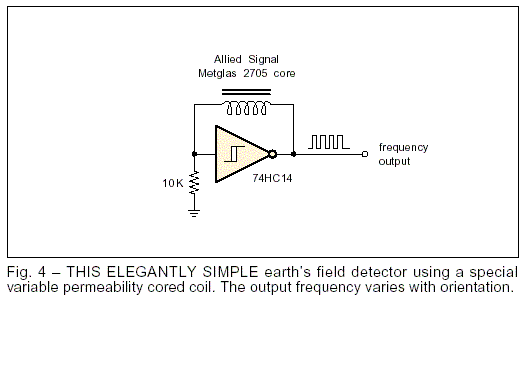Don Lancaster’sTech MusingsSeptember, 1996
More magnetometer info
You thus end up with a plain old coil whose inductance varies with the applied field strength. Put this in any suitable oscillator circuitry, and your output frequency should follow the strength and direction of the earth’s applied field. With proper design, as much as a 2:1 frequency change can be caused when you rotate the sensor through the compass points.
Whose permeability varies with field strength. By biasing as shown, a coil can be built so its inductance strongly varies with compass orientation.What is really unique here is that a
single ultra cheap solenoid winding over an ordinary core bar or rod acts both as a field sensor and the control bias setter. The sensing gets done by measuring the inductance. And the
biasing by inputting a dc current. Has anyone built one?

7414 sensor
More magnetometer info
You thus end up with a plain old coil whose inductance varies with the applied field strength. Put this in any suitable oscillator circuitry, and your output frequency should follow the strength and direction of the earth’s applied field. With proper design, as much as a 2:1 frequency change can be caused when you rotate the sensor through the compass points.
Whose permeability varies with field strength. By biasing as shown, a coil can be built so its inductance strongly varies with compass orientation.What is really unique here is that a
single ultra cheap solenoid winding over an ordinary core bar or rod acts both as a field sensor and the control bias setter. The sensing gets done by measuring the inductance. And the
biasing by inputting a dc current. Has anyone built one?

7414 sensor
